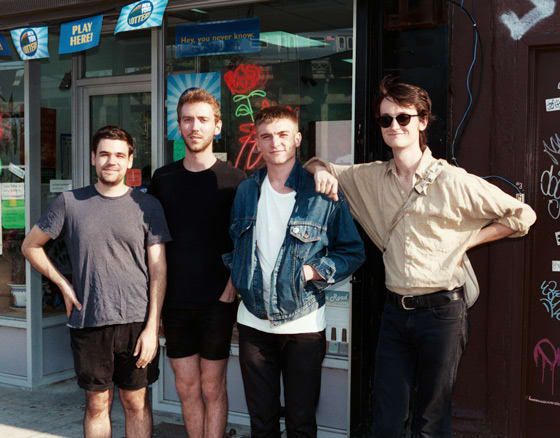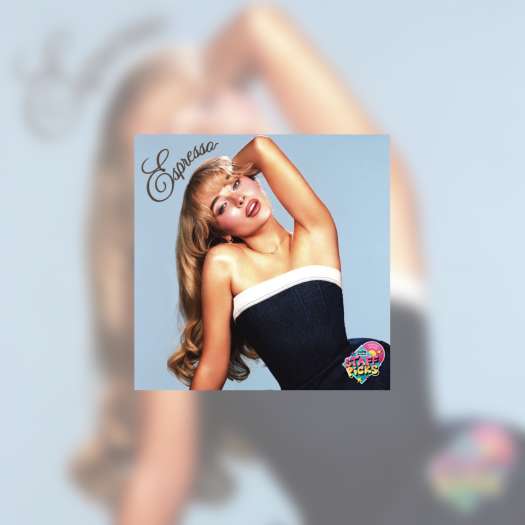After releasing their acclaimed debut album More Than Any Other Day in 2014, Ought found themselves touring practically non-stop, playing shows across Europe and North America. So it's not surprising that when the Montreal post-punk band call to talk about their latest album, Sun Coming Down, it's also from the road, this time post-soundcheck in the Italian island town of Fordongianus.
Whereas other groups might grow fatigued after spending so much time on the road, the quartet — vocalist and guitarist Tim Darcy, drummer and violinist Tim Keen, keyboardist Matt May and bassist Ben Stidworthy — are completely enthused to discuss their travels to far-flung locales as well as their return in early 2015 to the city where they first met as U.S. and Australian expats.
"Being on tour is like a weird stasis, doing the same thing every day," says Stidworthy. "So we've definitely learned a lot about this lifestyle and getting used to that."
"It's not overwhelming," adds Darcy. "I didn't feel like I ran a marathon. I slept for like a day-and-a-half, and then felt back to normal."
Captured at Montreal's Hotel2Tango studio, Sun Coming Down is more deliberate and measured than the first album or their 2014 EP Once More With Feeling… As Keen puts it, "Where we would have an explosion before, we don't necessarily jump to the explosion." Sun Coming Down's eight songs reflect a band continuing to hone their studio process. "We got a routine together fairly quickly — we would go in every day and write," says Darcy. "It was the first time we had a strict schedule; we never had an end date to when we wanted to have an album done or have work done before, so there was a particular kind of impetus that was new to us."
Like the majority of their interviews, their approach to recording is evidently democratic, with every member contributing. Songs like "Men For Miles" and "Celebration" bristle with the energy and wry observational humour Ought fans have come to expect; elsewhere, the group collectively point to the slow-burning "Passionate Turn" as an example of a departure from their tightly wound post-punk. "When it came to certain tone decisions or certain aspects of how we wanted it to sound, there was a lot more deliberate intention behind how we wanted things to sound and how we wanted things to feel," says Stidworthy. "That's the biggest difference."
The album's centrepiece, "Beautiful Blue Sky," a longtime staple of their live shows, is a seven-minute-long anthem containing Darcy's cathartic declaration, "I am no longer afraid to die because that is all that I have left." While the song name-checks markers of consumerism, gentrification, and political unrest, including condo developments, oil freighters, and war planes, the quartet insist their core beliefs are more subtle than their audiences might expect.
"When the label 'art rock' gets used to describe us — it's funny to me for a number of reasons, but particularly because it invokes this seriousness," says Darcy. "It's there in the sense that I care a lot about making good and interesting music, but I'm not sitting around stewing." The story of how More Than Any Other Day was largely influenced by the 2012 Quebec student protests was quickly built into Ought's mythology, but they prefer to leave their lyrics ambiguous and open to interpretation.
"I personally really value the fact that we're a live band who have 'Clarity' and 'Gemini' — it represents the spectrum of the emotions that we actually go through," says the singer. Clearly the group thrive on contrasts, whether it be in their stage demeanour, light-hearted internet presence or media they consume. (A quick inventory includes but isn't limited to: Brazilian writer Clarice Lispector's Agua Viva, FKA twigs' latest EP M3LL155X, James Baldwin's 1962 novel Another Country, and the French film Rosetta by the Dardenne brothers.) "I wouldn't want to be in a purely silly band, nor a band that doesn't have a sense of humour," says Darcy. "It's not so much an artistic decision of eliminating emotions or whatever, it's a product of who we are and the way we interact with things."
When asked to identify a defining characteristic that the group shares with other Constellation Records acts, like Godspeed You! Black Emperor or Jerusalem In My Heart (Radwan Ghazi Moumneh produced Sun Coming Down), there's a long pause in the conversation. "It's tough to jump to something concrete," says Mays. "Don [Wilkie] and Ian [Ilavsky] have a really strong vision of what they want their label to be."
Adds Keen, "I am mostly interested in music that has a strong sense of community to it, and it builds around playing music with people you care about and for people that you care about."
While they admit it's difficult to keep up with their friends' migration patterns and music, they've wholly embraced their newfound online and offline audiences, encouraging them to share what they've been listening to. A quick scroll through their Twitter feed reveals the sense of community they gratefully and non-judgementally preach, whether it be sharing opening artists, Montreal groups, or their own side-projects (ranging from experimental ambient to noise).
"Regardless of whether or not we had a bunch of Twitter followers, I'd still be talking about my friends' bands. Frankly I'm still surprised when I meet someone at a show in Iceland or wherever and they say, 'Yeah I checked out that band you posted about,'" says Keen. "I feel on some level in my mind that I'm just shouting into the void."
Whereas other groups might grow fatigued after spending so much time on the road, the quartet — vocalist and guitarist Tim Darcy, drummer and violinist Tim Keen, keyboardist Matt May and bassist Ben Stidworthy — are completely enthused to discuss their travels to far-flung locales as well as their return in early 2015 to the city where they first met as U.S. and Australian expats.
"Being on tour is like a weird stasis, doing the same thing every day," says Stidworthy. "So we've definitely learned a lot about this lifestyle and getting used to that."
"It's not overwhelming," adds Darcy. "I didn't feel like I ran a marathon. I slept for like a day-and-a-half, and then felt back to normal."
Captured at Montreal's Hotel2Tango studio, Sun Coming Down is more deliberate and measured than the first album or their 2014 EP Once More With Feeling… As Keen puts it, "Where we would have an explosion before, we don't necessarily jump to the explosion." Sun Coming Down's eight songs reflect a band continuing to hone their studio process. "We got a routine together fairly quickly — we would go in every day and write," says Darcy. "It was the first time we had a strict schedule; we never had an end date to when we wanted to have an album done or have work done before, so there was a particular kind of impetus that was new to us."
Like the majority of their interviews, their approach to recording is evidently democratic, with every member contributing. Songs like "Men For Miles" and "Celebration" bristle with the energy and wry observational humour Ought fans have come to expect; elsewhere, the group collectively point to the slow-burning "Passionate Turn" as an example of a departure from their tightly wound post-punk. "When it came to certain tone decisions or certain aspects of how we wanted it to sound, there was a lot more deliberate intention behind how we wanted things to sound and how we wanted things to feel," says Stidworthy. "That's the biggest difference."
The album's centrepiece, "Beautiful Blue Sky," a longtime staple of their live shows, is a seven-minute-long anthem containing Darcy's cathartic declaration, "I am no longer afraid to die because that is all that I have left." While the song name-checks markers of consumerism, gentrification, and political unrest, including condo developments, oil freighters, and war planes, the quartet insist their core beliefs are more subtle than their audiences might expect.
"When the label 'art rock' gets used to describe us — it's funny to me for a number of reasons, but particularly because it invokes this seriousness," says Darcy. "It's there in the sense that I care a lot about making good and interesting music, but I'm not sitting around stewing." The story of how More Than Any Other Day was largely influenced by the 2012 Quebec student protests was quickly built into Ought's mythology, but they prefer to leave their lyrics ambiguous and open to interpretation.
"I personally really value the fact that we're a live band who have 'Clarity' and 'Gemini' — it represents the spectrum of the emotions that we actually go through," says the singer. Clearly the group thrive on contrasts, whether it be in their stage demeanour, light-hearted internet presence or media they consume. (A quick inventory includes but isn't limited to: Brazilian writer Clarice Lispector's Agua Viva, FKA twigs' latest EP M3LL155X, James Baldwin's 1962 novel Another Country, and the French film Rosetta by the Dardenne brothers.) "I wouldn't want to be in a purely silly band, nor a band that doesn't have a sense of humour," says Darcy. "It's not so much an artistic decision of eliminating emotions or whatever, it's a product of who we are and the way we interact with things."
When asked to identify a defining characteristic that the group shares with other Constellation Records acts, like Godspeed You! Black Emperor or Jerusalem In My Heart (Radwan Ghazi Moumneh produced Sun Coming Down), there's a long pause in the conversation. "It's tough to jump to something concrete," says Mays. "Don [Wilkie] and Ian [Ilavsky] have a really strong vision of what they want their label to be."
Adds Keen, "I am mostly interested in music that has a strong sense of community to it, and it builds around playing music with people you care about and for people that you care about."
While they admit it's difficult to keep up with their friends' migration patterns and music, they've wholly embraced their newfound online and offline audiences, encouraging them to share what they've been listening to. A quick scroll through their Twitter feed reveals the sense of community they gratefully and non-judgementally preach, whether it be sharing opening artists, Montreal groups, or their own side-projects (ranging from experimental ambient to noise).
"Regardless of whether or not we had a bunch of Twitter followers, I'd still be talking about my friends' bands. Frankly I'm still surprised when I meet someone at a show in Iceland or wherever and they say, 'Yeah I checked out that band you posted about,'" says Keen. "I feel on some level in my mind that I'm just shouting into the void."




